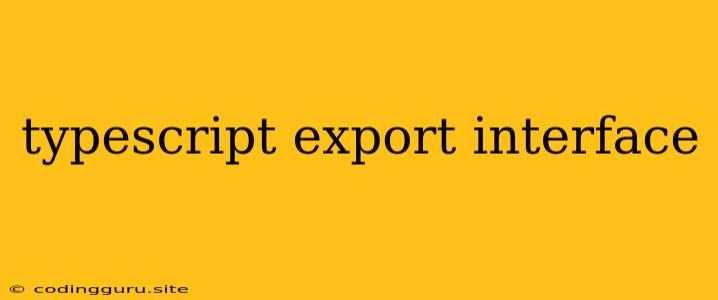Understanding TypeScript's Export Interface: A Comprehensive Guide
TypeScript's export interface is a fundamental concept for building robust and maintainable codebases. It allows you to define reusable data structures that can be shared across different parts of your project. But what exactly are export interfaces, and how do they improve your development workflow? Let's dive in.
What is an Interface in TypeScript?
In essence, an interface in TypeScript acts as a blueprint or contract for defining the structure of an object. It outlines the properties and methods that an object should have. Imagine an interface as a template for creating objects with specific characteristics.
For example, let's say you're building a library to manage customer data. You could define an interface named Customer:
interface Customer {
firstName: string;
lastName: string;
email: string;
phoneNumber: string;
}
This interface defines the expected properties for a customer object. Any object that conforms to this interface must have these properties, ensuring consistency and predictability in your code.
The Power of Export: Sharing Interfaces
The export keyword is crucial for enabling code reusability. When you export an interface, you make it available for use in other files or modules within your project. This is where the real power of export interfaces comes into play.
Let's illustrate this with an example. Imagine you have a file named customer.ts containing the Customer interface we defined earlier:
// customer.ts
export interface Customer {
firstName: string;
lastName: string;
email: string;
phoneNumber: string;
}
Now, in another file, let's say customerService.ts, you can import and use the Customer interface to define functions that work with customer data:
// customerService.ts
import { Customer } from './customer';
function createCustomer(customer: Customer): Customer {
// ...implementation to create a new customer object
return customer;
}
By exporting the Customer interface, you can ensure that any component interacting with customer data adheres to the same structure, promoting modularity and consistency in your code.
Benefits of Using Export Interfaces
The benefits of using export interfaces in TypeScript are numerous:
- Code Reusability: You can define interfaces once and reuse them across multiple files and modules.
- Improved Readability: Interfaces make your code more readable by clearly defining data structures.
- Encapsulation: Interfaces help enforce encapsulation by defining how objects should interact with each other.
- Type Safety: TypeScript leverages interfaces for type checking, ensuring that data structures adhere to the defined specifications.
- Collaboration: Exporting interfaces facilitates collaboration within development teams, as everyone shares the same understanding of data structures.
Practical Examples
Let's explore some real-world examples of how export interfaces can be applied in TypeScript:
1. API Data Modeling: When working with external APIs, interfaces are essential for defining the structure of incoming data:
// api.ts
export interface User {
id: number;
name: string;
email: string;
}
// apiService.ts
import { User } from './api';
function fetchUsers(): Promise {
// ...implementation to fetch user data from the API
}
2. Component Props: Interfaces help define the expected props for React components, improving code maintainability and readability:
// myComponent.ts
interface MyComponentProps {
title: string;
data: Array;
}
// myComponent.tsx
import { MyComponentProps } from './myComponent';
const MyComponent: React.FC = ({ title, data }) => {
// ...component implementation
}
3. Function Arguments and Return Types: Interfaces define the structure of function arguments and return values, promoting type safety and code clarity:
// utils.ts
interface UserInput {
name: string;
email: string;
}
export function validateUserInput(input: UserInput): boolean {
// ...implementation to validate user input
}
Conclusion
Export interfaces are a powerful tool in TypeScript for defining reusable data structures and promoting code maintainability. By leveraging export interfaces, you can ensure type safety, improve code readability, and create a more robust and organized codebase.
Understanding export interfaces is crucial for any TypeScript developer striving to write clean, maintainable, and scalable code.
